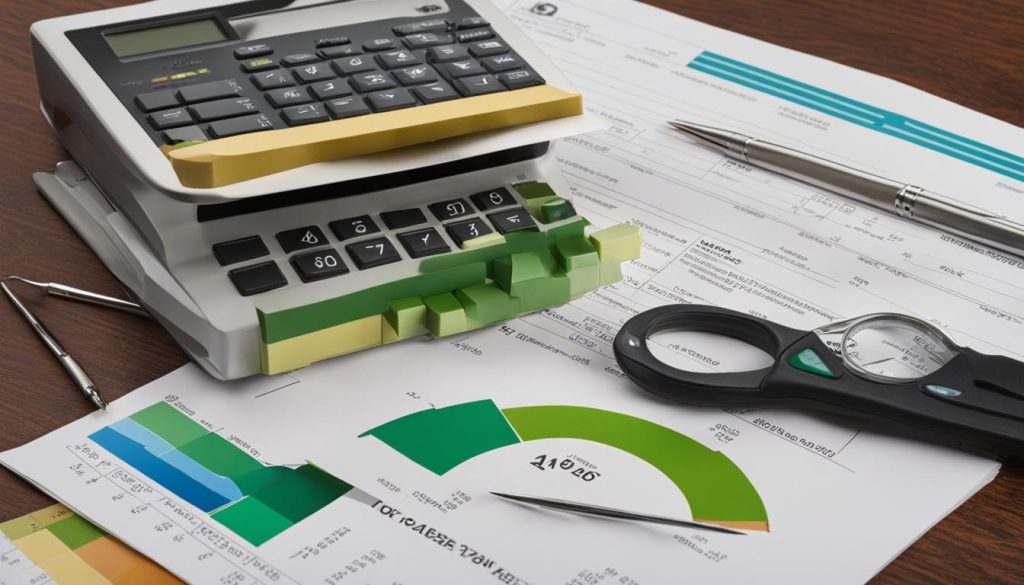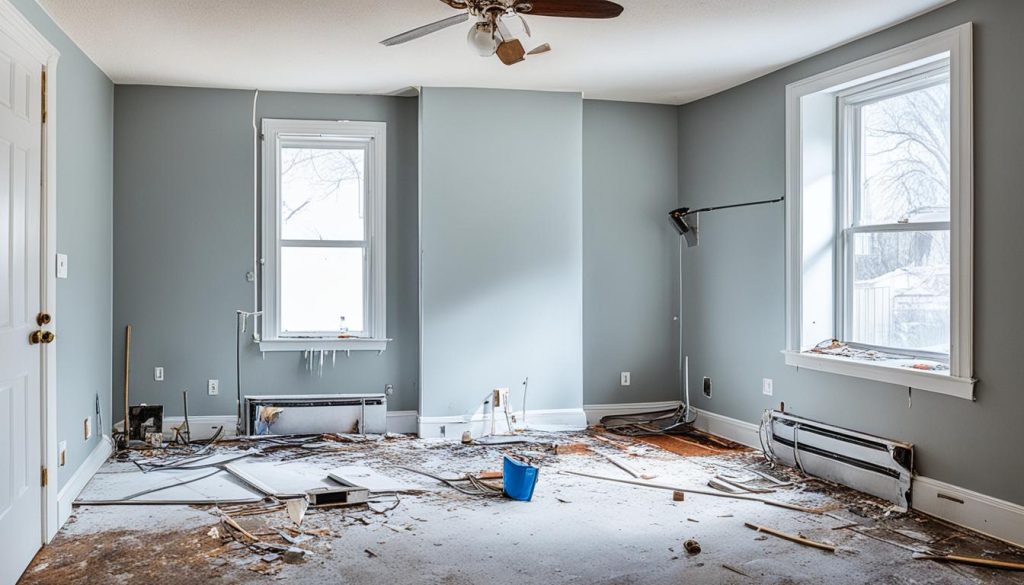Did you know that claiming renovations on your rental property can help minimize your tax liability in Canada? Rental income is considered taxable, but by understanding how to claim eligible expenses, you can maximize your deductions and reduce your overall tax burden. Whether you’re a seasoned property investor or just starting out, knowing the ins and outs of claiming rental property renovations can make a significant difference in your finances.
Key Takeaways:
- Claiming renovations on rental property can reduce your tax liability in Canada.
- Rental income is considered taxable, but eligible expenses can be deducted.
- Understanding the difference between current and capital expenses is crucial for maximizing deductions.
- There are several tax-deductible rental property expenses in Canada, including repairs, professional fees, and utilities.
- Accurate record-keeping and reporting are essential for successfully claiming renovations on rental property.
Understanding Current and Capital Expenses
When it comes to renovating your rental property, it’s essential to understand the distinction between current and capital expenses. This knowledge will enable you to properly claim deductions and navigate the complex world of rental property renovation expenses.
Current expenses refer to the costs incurred to maintain your rental property. These expenses are typically recurring and necessary to ensure the property’s functionality and habitability. Common examples of current expenses include repairs, maintenance, and regular upkeep.
On the other hand, capital expenses are expenditures that enhance the value of your rental property and have a long-lasting life. These expenses usually involve significant upgrades or improvements that extend beyond the scope of regular maintenance. Capital expenses can include renovations such as adding a new room, installing a swimming pool, or renovating the kitchen.
It’s important to note that current expenses can be fully deducted in the relevant tax year, providing immediate tax benefits. In contrast, capital expenses are added to the property’s value and depreciated over time, resulting in deductions spread out over several years.
To illustrate the difference between current and capital expenses, consider the following examples:
- Repairing a leaky faucet or replacing a broken window would be considered current expenses.
- Converting a basement into a separate living unit or installing solar panels would be classified as capital expenses.
By understanding the distinction between current and capital expenses, you can accurately report your rental property renovation expenses and claim the appropriate deductions on your taxes.
Tax Deductible Rental Property Expenses in Canada
When it comes to owning a rental property in Canada, there are various expenses that you can deduct on your taxes, resulting in potential tax benefits and reducing your taxable rental income. By claiming these deductions, you can optimize your financial situation and make the most of your rental property investment.
Here are some of the rental property expenses that you can claim on your taxes:
- Advertising fees: Costs associated with promoting and advertising your rental property.
- Home insurance premiums: Expenses related to insuring your rental property.
- Interest and bank charges: Interest paid on loans or mortgages used to finance the property or cover improvement costs.
- Office expenses: Costs for maintaining a dedicated office space for managing your rental property.
- Professional fees: Fees paid to accountants or other professionals for managing your rental property finances.
- Property taxes: Taxes paid to the municipality for owning a rental property.
- Repairs and maintenance costs: Expenses incurred to repair and maintain the rental property, including fixing appliances, repairing plumbing or electrical systems, and repainting.
- Salaries and management fees: Payments made to property managers or employees assisting in the management of your rental property.
- Travel expenses: Costs associated with traveling for property management purposes, such as inspecting the property or meeting with tenants.
- Utilities: Payments for utilities like water, electricity, and gas that are used for the rental property.
By claiming these expenses on your taxes, you can reduce your taxable rental income, potentially lower your overall tax liability, and take advantage of the tax benefits available to rental property owners in Canada. It’s important to keep detailed records and supporting documents to substantiate these expenses.
Keep in mind that rent expenses mentioned above are considered current expenses and are fully deductible in the relevant tax year. However, it’s essential to differentiate between current expenses and capital expenses when claiming renovations on your rental property. Understanding the distinction between these types of expenses ensures that you maximize your tax deductions and comply with tax regulations.
Claiming Rental Property Expenses on Your Taxes
To effectively claim rental property expenses on your taxes and maximize your deductions, accurate reporting of your rental income and deductions is essential. The Canada Revenue Agency (CRA) provides guidelines to help you document your rental income and expenses properly. By following these guidelines and using the prescribed forms, such as the T776 form, you can ensure that you claim all eligible expenses and benefit from tax credits, deductions, and potential tax relief for renovation costs, resulting in significant tax savings.
The T776 form serves as a comprehensive tool for documenting your rental income and expenses. It allows you to provide detailed information, such as rental income received, rental expenses incurred, and descriptions of the renovation work carried out on the property. You can fill out this form manually or take advantage of user-friendly tax software like TurboTax, which simplifies the process and helps minimize errors.
By accurately reporting your rental expenses, you can maximize your tax benefits and minimize your tax liability. This includes taking advantage of rental property renovation tax credits, which can provide significant savings. For instance, if you qualify for the Home Accessibility Tax Credit, you can claim a non-refundable tax credit of 15% on eligible expenses related to improving accessibility in your rental property. Similarly, the Canada Emergency Rent Subsidy (CERS) program provides financial relief for landlords who have experienced a decline in rental income due to the COVID-19 pandemic.
Claiming rental property renovation tax relief is not only about reducing your tax burden but also about investing in your property’s long-term value. By properly documenting your rental expenses, you can establish a comprehensive record of the improvements made, which can be beneficial when selling or refinancing the property in the future.

Remember, accurate record-keeping and diligent reporting are essential for successfully claiming rental property expenses on your taxes. By maintaining organized records, keeping receipts and invoices, and properly documenting your rental income and expenses, you can ensure compliance with tax regulations and maximize your tax savings.
Determining Capital vs. Current Expenses
Differentiating between capital and current expenses is crucial when claiming rental property expenses. Understanding the distinction allows you to accurately report your expenses and maximize your deductions. Generally, capital expenses provide lasting benefits and improve the property’s value, while current expenses restore the property to its original condition or maintain its functionality.
For example, suppose you replace carpet with hardwood flooring in your rental property. This would be considered a capital expense as it enhances the property’s value and has long-term benefits. On the other hand, if you paint the property to refresh its appearance, it would be considered a current expense since it restores the property’s aesthetic appeal without substantial improvements.
By determining whether an expense falls under capital or current, you can ensure compliance with tax regulations and accurately claim your rental property expenses.

Exceptions and Special Situations
When it comes to claiming rental property expenses, there are certain exceptions and special situations that you need to consider. These situations can affect how you classify your expenses and determine whether they are considered capital expenses.
One example is if you purchase an older home with the intention of renovating it immediately for rental purposes. In this case, all the costs incurred during the renovation period would be classified as capital expenses. It’s important to be aware of this distinction and properly categorize your expenses to avoid any discrepancies with the Canada Revenue Agency (CRA).
Another special situation arises when you plan to sell a property but decide to renovate it beforehand to prepare it for rent. In this scenario, the renovation costs would also be considered capital expenses. This is because the renovations are aimed at increasing the property’s value and appeal to potential tenants.
Understanding these exceptions and special situations is crucial to ensure proper tax treatment and compliance with tax regulations. To navigate this complex landscape, it’s wise to consult with a tax professional who can provide expert advice tailored to your specific circumstances.
Example: Capital Expenses for Renovating an Older Home
| Type of Expense | Description |
|---|---|
| Materials | Costs of purchasing construction materials, such as lumber, flooring, and tiles. |
| Labor | Payments made to contractors, electricians, plumbers, and other professionals involved in the renovation process. |
| Permits and Inspections | Fees paid to obtain necessary permits and undergo required inspections during the renovation process. |
| Architectural and Design Services | Costs associated with hiring architects or designers to create plans and layouts for the renovation. |
Proper Record-Keeping and Reporting
To ensure you can claim rent expenses on your taxes and effectively report your rental income and expenses, it’s essential to maintain accurate records. By keeping detailed documentation, you can support your deductions and maximize your potential tax benefits. Here are some essential tips for proper record-keeping and reporting.
Firstly, it’s important to keep receipts, invoices, and any other relevant documents related to your rental property expenses. This includes receipts for maintenance and repairs, renovation costs, and any other eligible expenditures. These records serve as evidence to substantiate your claims and demonstrate the validity of your deductions.
When it comes to reporting your rental income and expenses on your tax return, you can use form T776 provided by the Canada Revenue Agency (CRA). This form helps you accurately report the income you earned from your rental property as well as the associated expenses. Alternatively, you can utilize tax software, like TurboTax, to streamline the reporting process.
By maintaining proper records and diligently reporting your rental income and expenses, you not only ensure compliance with tax regulations but also optimize your tax benefits. Keeping organized records and reporting accurately is crucial for claiming rent expenses on your taxes and maximizing your deductions.
FAQ
How do I claim renovations on my rental property?
What rental property expenses can I deduct on my taxes in Canada?
How do I differentiate between capital and current expenses for my rental property?
Are there any exceptions or special situations when claiming rental property expenses?
How can I maximize my deductions for rental property expenses?
Source Links
- https://turbotax.intuit.ca/tips/tax-deductions-on-rental-properties-6382
- https://realestatetaxtips.ca/how-to-write-off-renovation-expense-the-right-way/
- https://www.canada.ca/en/revenue-agency/services/tax/businesses/topics/rental-income/completing-form-t776-statement-real-estate-rentals/rental-expenses-you-deduct.html

Leave a Reply
You must be logged in to post a comment.